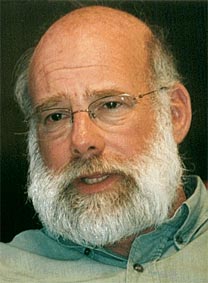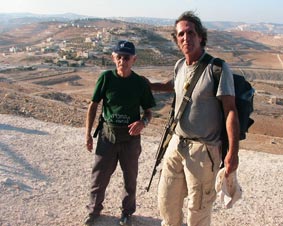Past the point of no return

A 'Middle East federation' made up of Israel and its neighbours may be one way around the Palestinian crisis, Dr Jeff Halper tells David Shanks in the West Bank, because a sovereign Palestinian state is now not attainable. Photographs by David McKenna
think almost everybody among the Palestinians has already reached the conclusion that we are at the point of no return [in the pursuit of an independent Palestinian state] but they can't say it – they can't go there – because then there is nowhere else to go."
I had asked former anthropology professor Dr Jeff Halper, a Jewish American-born Israeli and non-violent campaigner for Palestinians, whether there was a tipping point beyond which "the two-state solution" would be out of the question. An Israeli politician, Meyer Margolite of the liberal Meretz party, had told Village it was about two years away.
But Halper thinks we have already passed it because of the rate of settlement-building and Israel's still-incomplete 670km-long, nine-metre high "apartheid wall", which divides Palestinians from each other, from their land, their olive groves, from worship and is designed to hermetically seal off about half a million settlers from Palestinians. He has another idea.
During a week-long visit to the West Bank with a disparate group of 26 Irish people I heard little hope for any kind of solution to a crisis seen widely as the worst it has been since the establishment of the Palestinian National Authority in 1994.
In the nearby Gaza Strip, violent clashes between Fatah and Hamas threaten to erupt into a fullscale civil war and a US-led aid-freeze is creating a humanitarian crisis, according to analysts and to Palestinians we met.
The Irish group found a people feeling assaulted and restricted by a system involving over 500 checkpoints in their own territory, daily harassments and frequent killings.
The Palestinians we met feel punished for democratically electing the Hamas-led Palestinian National Authority government last January.
An NGO academic in Bethlehem, Dr Jad Issac, produced a study showing the wall is part of a land-grab designed to reduce a population of about 2.5 million to a population of about a million to serve as a low-paid labour force and to leave Palestinians with about seven per cent of their own territory.
Palestinians we met said cruel experience had taught them not to believe in a one-state solution, in which Israel would recognise Palestinians as equals. One campaigner, Angela Godfrey-Goldstein, advocacy campaigner with Halper's organisation, the Israeli Committee Against [Palestinian] House Demolitions, said: "Let's call a spade a spade. This is ethnic cleansing."
What the now comatose former Israeli prime minister, Ariel Sharon, called a system of cantons for the Palestinians "we call a bantustan", said Halper. "Actually it is worse." The former South African model for cheap labour is undermined in Israel, he said, by the presence of about 300,000 foreign workers from Thailand, the Philippines and Romania. They undercut the Palestinians, locking them out of the labour market.
During a meeting with Conor O'Riordan, Ireland's representative to the Ramallah-based Palestinian Authority (PA), the Irish group (not affiliated to any Palestine solidarity group) was told that EU states "had no choice" but to freeze aid to the Hamas-led government because of its refusal to renounce violence, to recognise prior agreements with Israel and to recognise Israel. (The freeze has meant that hundreds of PA employees have gone without salaries for almost nine months. But his office was making every possible effort through deft banking and "social allowances" to Palestinians to get aid to ordinary people.)
However, Yonatan Touval, a policy analyst with the Economic Cooperation Foundation, a Tel Aviv-based think-tank dedicated to a final status settlement, disagreed with this western "no choice" position in a recent International Herald Tribune commentary.
The "quartet" of the UN, EU, Russia and the US had failed to appreciate that Hamas had already reportedly agreed to two of the US-led quartet conditions, though not the last – recognition of Israel.
These were "positive, if gradual, changes in Hamas's position" but unfortunately the international community was "insisting all the more strongly that Hamas also meet the third condition of recognising Israel".
"Israel may demand recognition, but it certainly does not need it." He pointed out that when Israel negotiated peace treaties with Egypt and Jordan those countries recognised Israel only "at the end – not the start of negotiations". In peace talks with Syria "recognition was not a precondition", Touval wrote.
"Recognition... is a political and diplomatic instrument and should be used wisely. Given the current crisis in the Palestinian territories, to continue to insist on verbal affirmations is to sacrifice lives and hopes on the altar of an abstract idea," he concluded.
Halper, who was (unsuccessfully) nominated by American Quakers for the Nobel Peace Prize, is known internationally but his views get little exposure within Israel. His vision for the long-term future involves a Middle East federation embracing Israel, Palestine, Jordan, Syria and Lebanon based on the model of the EU when it was the EEC – and member-states had more opt-out powers.
"The hard part is getting Israel to agree." But he doesn't think it impossible "if the international community – the quartet whatever you call it – would say a Middle Eastern federation is where we're going in 10 years" and guarantee it with a timeline and a programme.
"It reconstructs the historic geographic, economic, cultural unity of this part of the world. I think it makes a lot of sense. In the first stage say to the Palestinians: you're going to get a viable state so take whatever you can get. Israel could possibly go this far. It still controls the settlement blocks. It still contains Jerusalem. It still controls the Jordan River, the border.
"The Palestinians get a little bit more land. Take it because at least it gives you political sovereignty; at least you are part of the international community – at the UN." They could even have their own money and not suffer the indignity of carrying shekels and ID in Hebrew, which I heard they bitterly resent.
Halper argues his idea relieves the Palestinians of "their non-viability burden. In the federation you are separating the issue of viability from sovereignty – and neutralising it. The sovereignty is in the member-state and the viability is in the region."
"Israel's big problem is with the right of return. It doesn't want refugees to come back looking for citizenship because Israel would not be a Jewish state."
The beauty of this plan, he argues, is that the Palestinians would not get a prison state – as at present.
"So if you say that the citizens can live and work wherever they want to within the Middle East, Palestinians in Jordan would have a choice. They could remain Jordanian citizens or they could become Palestinian citizens."
The plan obviously has warts but Halper added: "People are going to start looking around for another solution. What I'm saying is that this Middle East federation is in the pot."
Lest you think I found more such creative forward-thinking, here is Nasser Lahham, chief editor of the Bethlehem-based Ma'an news agency, speaking of the political crisis and the late PA president, Yasser Arafat:
"They surrounded him and poisoned him. They fucked the other leaders and then asked where our partner is."
He tried hard to get me a Hamas interviewee but came back with: "Sorry, they are all in prison... I don't have a solution... This is hurting me even to talk." p
